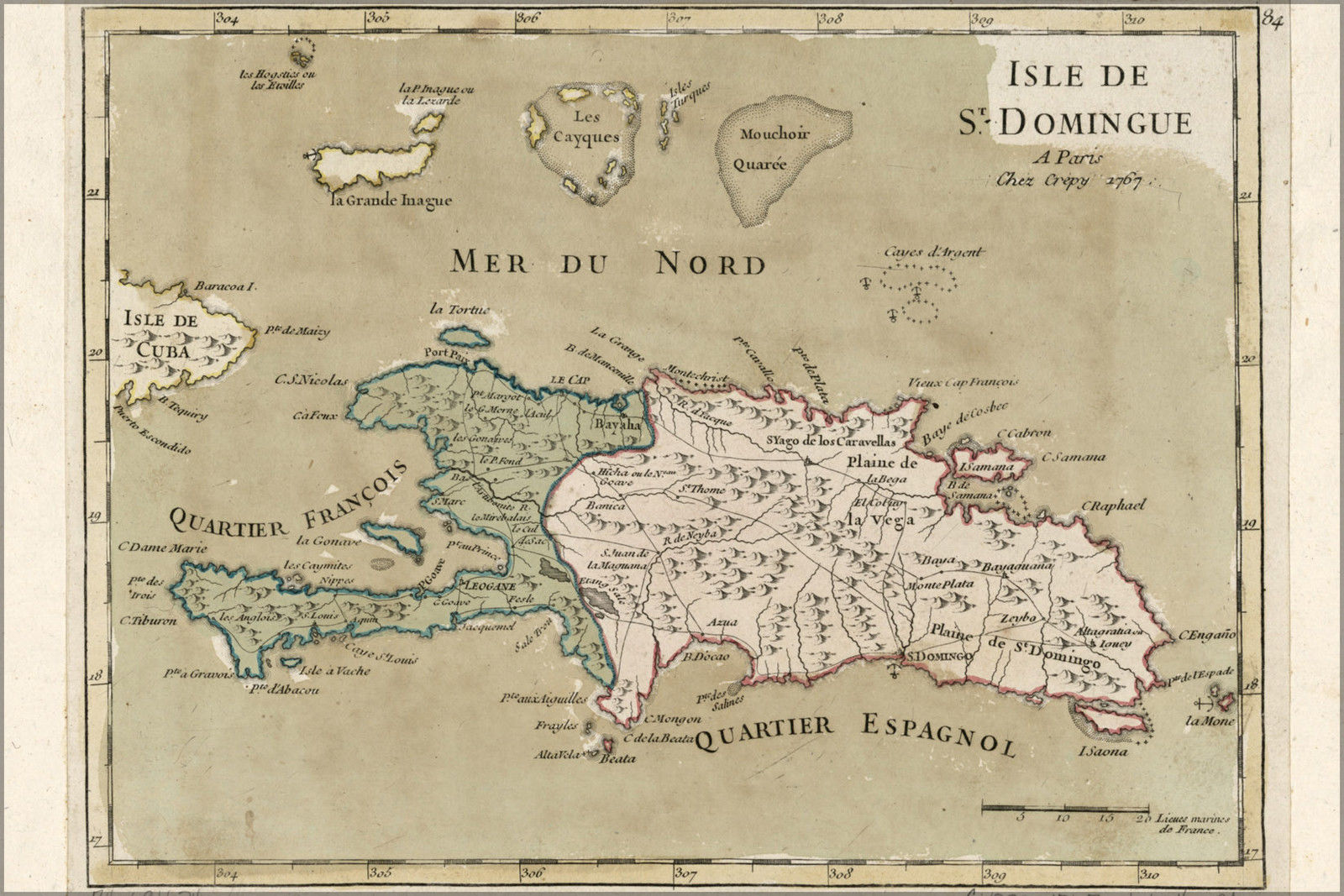On “An Island, Divided,” Afropop Worldwide explores the complex relationship between the two countries that share the island of Hispaniola—the Dominican Republic and Haiti. One of the experts interviewed in the program is Paul Austerlitz, an ethnomusicologist and jazz musician who teaches Africana studies and jazz at Gettysburg College. He’s done extensive research in the Dominican Republic, and Haiti, as well as performing with local musicians in both countries. He is also the author of the seminal book in English on merengue history, entitled Merengue and Dominican Identity.
Afropop producer Marlon Bishop spoke with Professor Austerlitz for the program about the musical connections between the D.R. and Haiti, and we’ve transcribed an excerpt of their conversation here.
Marlon Bishop: How would you characterize what was generally, or most broadly the relationship between the two countries?
Paul Austerlitz: Well, most broadly, they share an island and as often happens with neighbors, they have not had the most cordial of relationships for a very long time. Despite this, they share many, many things, especially in the realm of music and traditional religion, which are realms that are often overlooked when we look at the political relationships between the two countries. There are a lot of connections but pointing to those connections doesn't mean that the conflicts between the two countries and the differences are not immense.
What are those conflicts?
Well, the Dominican Republic is a majority black country and in fact the first black people on that island were on the side that's now the Dominican side. But despite this, Dominican identity is very Eurocentric so Dominicans tend to identify with their European ancestry rather than their African ancestry. The percentage of people of African descent there is much higher, for example, than in Cuba or Puerto Rico. But the identity, the way people think about themselves, is less focused on Africa. By contrast, Haiti is also of course a majority black country and is much darker skinned on the whole than is the Dominican Republic, and because the Republic of Haiti was founded in 1804 as a result of a successful slave uprising. Their national identity is very Afrocentric.
So those two things are very, very different. Haiti, in my opinion, was punished by the imperial powers for its success in fighting colonialism. Dominicans, in my belief, kind of as a survival strategy, have chosen or subconsciously chosen to distance themselves from that narrative of revolution, and Afrocentrism as a way of surviving in a largely Eurocentric colonial and post-colonial world.
So in a way you're saying that it's not so much about, “Oh, we're going to be racist for its own sake.” It’s more like reading the cards and seeing that celebrating blackness is not a winning proposition in a geopolitical or economic sense. They kind of see it like that?
I am saying that. I mean that's my interpretation, because I've been confronting this issue for my whole professional life and I've tried to kind of come up with some reason behind it.
Maybe I'm wrong.
For example, my father was Jewish from Europe and he came here in 1937 to escape the Holocaust. And most of his relatives there, at least the ones in the Czech Republic, ended up in concentration camps. Despite that, he never talked to me about being Jewish. I don’t think he was anti-Semitic in any way but he just distanced himself from his Jewish identity. And after he passed I thought about that a lot and I just couldn't understand it and I felt anger towards him for that. But then I realized what he had been through. In his case, I think that was a survival strategy. Just distancing himself from his Jewish identity in what he perceived was an anti-Semitic world. So that's what kind of gives me a personal way to think about that rejection of blackness in the Dominican Republic.
So how does that anti-blackness kind of manifest itself in the D.R.?
Well, the classic example is that people talk about the Dominican national ID card, which for many years, had these categories of White, Indian and Negro. But no one checked off the “Negro” category. People would say they were Indian to kind of distance themselves from blackness. Often the dictator, Rafael Trujillo, who reigned from 1930 to 1961 is blamed for this, but this identity predates Trujillo and postdates Trujillo. Trujillo did have a role in really, really exacerbating this identity. That anti-black policy of his was epitomized by his 1937 genocide of many, many Haitians that lived in the Dominican Republic which occurred despite the fact that his own grandmother was Haitian.
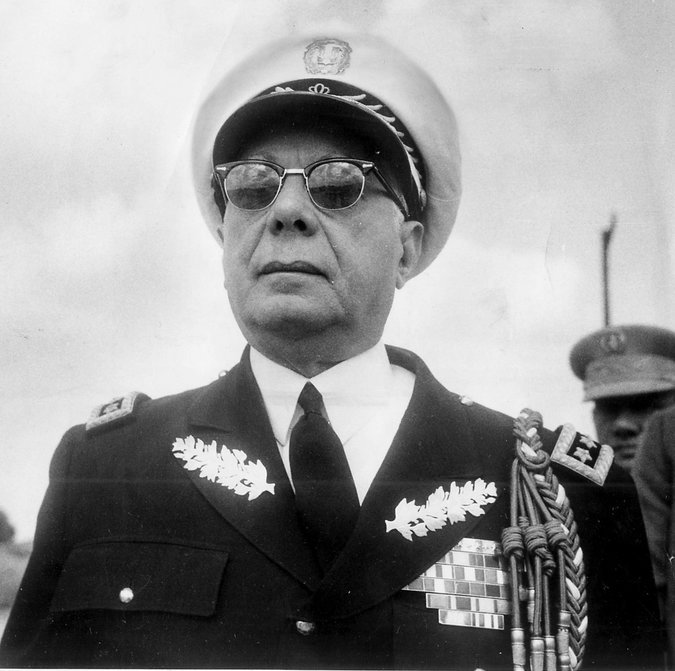 Rafael Trujillo
Rafael Trujillo
The thesis of my book on merengue is that Trujillo supported merengue and turned it into a national music because it was perceived to be closer to Europe on the scale of Dominican musical genres than were some other forms of music like palo or gagá. He did this despite the fact that merengue is also highly African influenced. Trujillo also banned African religion, he banned vodou, but we know that he practiced vodou. The folklorists that wrote under his regime who were supporting his ideology argued that merengue was European despite the fact that it's both European and African. It's very African in addition to its European components, so it's kind of this ambivalence.
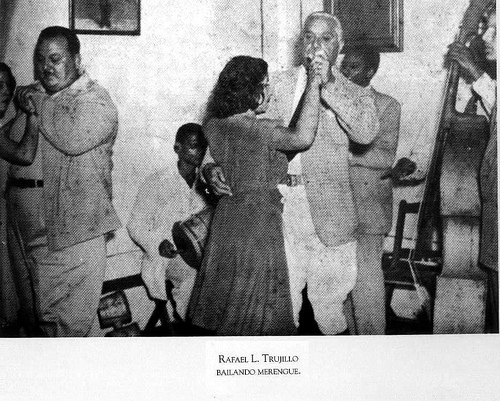
Rafael Trujillo dancing to merengue.
Speaking of that, let's talk a little bit about how music in the earlier period of the island interacted.
O.K. As I said the first black folks on the island were on what's now the Dominican side and there was and is a lot of African-influenced music, the most prominent genre of which is called palos drumming. These drums are played traditionally in ceremonies revering ancestors in contexts that are put together by fraternal organizations. Now more recently the same music is played for vodou spirits. This music is very African but it's very different than Haitian music. I just mentioned that to dispel the idea that the African influence in the Dominican Republic all comes from Haiti.
At the same time, another interesting anecdote showing the blackness of Dominican culture is that the supposed founder of one branch of Haitian vodou which is called petwo, which is a Congolese branch of vodou which is considered to be very hot and powerful. One folklore tradition attributes the founding of that branch of vodou in Haiti to a black man from the Dominican side of the island whose name was Don Pedro. Whether or not that's true, I don't know, but it's interesting that the story exists.
At the same time, of course, sharing an island, the two have traded a lot of influences. Haiti being more populous and the Dominican Republic being more prosperous economically has created a situation where Haitians have often moved to the Dominican Republic. So when I travel to Haiti, my friends there know things about the D.R.. You know well-off people go there on vacation, they go to resorts. Working class people go there to work. So there's been a lot of Haitian influence in the D.R. especially in a in a genre that's called rara in Haiti and, because Spanish speakers have trouble with that French “r” sound, in the D.R. it’s called gagá. So there's a huge influence of that in the Dominican Republic and it was originally among descendants of Haitians and among Haitian immigrants, but it's become ingrained in Dominican culture so gagá is considered a Dominican genre today.
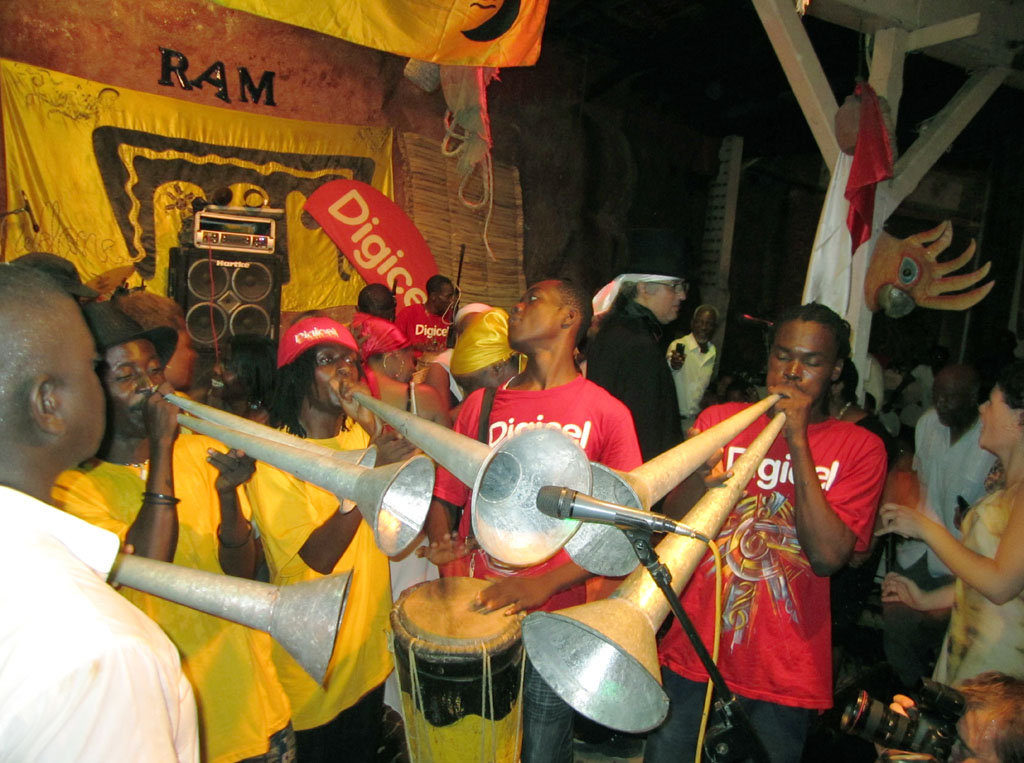 Haitian rara players.
Haitian rara players.
Tell me about the relationship between merengue and compas.
O.K. First of all, merengue originally in the 19th century was a genre that was generalized throughout the Caribbean. We have data about merengue in the 19th century in Cuba, Puerto Rico, Dominican Republic, Haiti and Venezuela. This despite the fact that today we think of it as a Dominican genre. But there is also a form of merengue called méringue in Haiti. Merengue and méringue were syncretic genres which mixed African and European influences based in the contredanse which was a dance that Louis the XIV was enamored of and spread throughout the Americas So you had what I call contradanse transformations among which merengue was one.
That’s how a lot of Latin American genres started, right?
Right—the danza in Puerto Rico and the danzón in Cuba and perhaps the tango. So in all these genres you can hear the European influences but they have an African tinge to them. So anyway méringue in Haiti and merengue in the Dominican Republic have a common root.
We would not probably be talking about Dominican merengue today if it hadn't been for the support that the dictator Trujillo gave the genre and kind of promoted it as a national dance and music. He never made a decree saying that, but he supported it and he mandated that merengue bands sing in praise of his dictatorship and he made it into a big thing. They played a lot of merengue on the radio during his reign. Because of that support, merengue spread to the United States, already in the '50s, and it spread to Haiti because of radio broadcasts and recordings. So in the 1950s people were listening to modern Dominican merengue, which is different than Haitian méringue, and this 1950s form of Dominican merengue influenced Haitian popular music in the 1950s under the aegis of a bandleader who his name was Nemours Jean-Baptiste and he kind of reworked influences from Dominican merengue and turned it into a genre that was called compas direct, meaning “direct beat.”
His music was highly influenced by Dominican merengue and that music ended up being very long-lived in Haiti and developed and changed stylistically through the years. So that was a strong Dominican influence on Haitian music.
What about the Haitian influence on Dominican music?
Well, my belief is that, while music is often a very powerful marker of ethnic identity, it's kind of a fluid marker so it can mean different things at different time. People listen to things and ascribe new meanings to them or forget the old meanings when they feel like forgetting them.
For example, I have a band in the Dominican Republic. In addition to being a musicologist, I'm a musician and the other musicians in the band are Dominican. There are some of the best roots musicians there and I've had the privilege of collaborating with them and we play jazz blended with Dominican music. We also play some Haitian songs and sometimes we sing Haitian vodou songs in Haitian kreyol. We play mainly for upper-middle class Dominicans who on the whole, I hate to generalize, but there's a lot of the anti-Haitianism in that community. But when we sing in Haitian kreyol, I've noticed that often people sometimes even sing along in the kreyol words and people would just accept it.
Wilfrido Vargas who was one of the biggest stars of all time. Some of his big hits were just reworkings of Haitian compas songs which was interesting because compas was so influenced by merengue and then Wilfrido’s merengue was influenced by compas. In fact in my interview with Frida Vargas, I said, “Wow, you seem to have been interested in Haitian music,” and he said, “Yes, because Haitian music is the most transcendent music in the Caribbean.”
So music has this kind of multivalency. Maybe this is romantic and maybe it's just wishful thinking, but I do believe that deep down Dominicans and Haitians know that they share common African and European roots. They share a common land and somewhere deep down these bridges are being built in through music.
I read in your article about another example —a song called “Pa Cone.”
Yes—I was really struck in my research by one traditional merengue that was performed by a group that was sponsored by Trujillo in the 1950s. And it's called “Pa Cone,” which means “I don't know” in kreyol. And the song, which is just a traditional merengue song sung primarily in Spanish, says “where is Belié Belcán?” Belié Belcán is the Dominican vodou spirit. And the answer is back is in Haitian kreyol, “I don't know.” And it goes through this list of vodou spirits and always the answer is “I don't know.
So this song that was recorded during the height of the Trujillo era performed on radio owned by the Trujillo family. First of all it's talking about vodou in an open way even though vodou had been outlawed by Trujillo. But more interesting than that—it’s like the song is saying “where is he, where is he? I don't know. I don't know.” “I don't see him but he's there anyway.” And a friend of mine said to me that, oh, that's because vodou in the Dominican Republic is “mute culture.” It’s culture but it doesn't speak because the speech has been censored. It was dangerous to say that in under the Trujillo regime. But in the song, the Trio Reynoso, could talk about it.
And I'll go farther—there's all kinds of hidden language, a mute language that when one learns that one starts seeing African religion all over the Dominican Republic. And music is one of the primary ways that these that these traditions speak.
Are there any other examples of cross-island musical influences that stand out to you?
Well, I would say that the other manifestation that's really important to think about is a more open manifestation.
After Trujillo died, a movement of Dominican roots music took shape in the 1970s and continues until this day. And that movement started as a kind of Dominican branch of nueva trova. This was music which was a leftist form of music that developed in Latin America at that time. Because the working class in the Dominican Republic is primarily black, that focus on working people's music and rural peasant music as a matter of resistance to imperialism kind of eventually, gradually, sort of became an Afro-Dominican movement.
So the early years, a really famous group called Convite performed this kind of music in the 1970s, and they were not only a musical group but they also did political organizing. And then other people started taking up that banner in the 1980s and until today the most prominent of whom are José Duluc, Xiomara Fortuna and Toni Vicioso, all of whom I've had the great privilege of collaborating with.
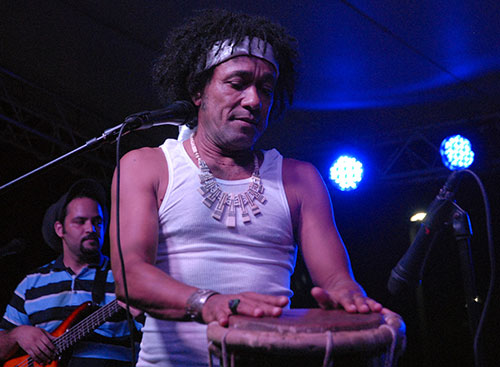
José Duluc
So they started taking Dominican music from the countryside--Afro Dominican music--and blending it with rock and with jazz. And Duluc took this very far. He moved to a very rich rural region of the Dominican Republic called Villa Mella for several years. He was not from this area but he just lived there making very very little money and just living with the local people and really learning the music in much more depth than any ethnomusicologist could by going there for a few months or whatever. I mean he was there for several years. So he really immersed himself in these forms of culture and I consider him a cultural treasure of the Dominican Republic.
So wrap things up—where do the political and cultural divisions between the two countries go from here?
Well, recent years have seen a kind of increase in anti-Haitianism in the Dominican Republic, which is very sad in my view. There's a lot of anti-immigrant sentiment, which has been stoked by the Dominican right wing and supported by the centrist government. Very similar to the rhetoric that Donald Trump uses. The interesting thing is that it predates Trump's rise.
At the same time, these other streams of influence are real even though they're not as obvious. There are groups of young middle-class Dominicans who are really interested in gagá and Afro-Dominican music. And in the rural areas there has been an increase in public ceremonies with Afro-Dominican music and religion, which kind of signals that there's less shame. In the Dominican community of New York City, there are a lot of people that have really tried to promote better relationships with Haiti.
And, I was talking to Duluc, the great musician I mentioned before, and I asked, “Don't you ever get impatient with all this anti-Haitianism and anti-black sentiment?” And he said, “No. I look at the bright side, I see all these great things that young people are coming around to.” And he's been saying that to me for 20 years. You know and sometimes I'll say, “I don’t know man, that’s what you said 20 years ago” and he says, “yes but I do believe this and it's real. A change will come.”








